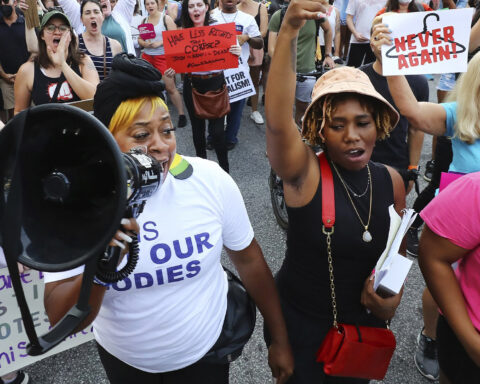By Anoa Change
An intergenerational group of lawmakers from the House of Representatives took action ahead of a Senate vote on the Women’s Health Protection Act. While some may see this as more political theater, continuing to push for equitable treatment and respect for personal privacy rights is critical at this moment.
In remarks on the House floor, Rep. Ayanna Pressley challenged the idea of personal freedoms and civil liberties for the few, as a minority takes away the right to bodily autonomy.
“I cannot stomach one more lecture about the preservation of civil liberties when you seek to deny me the very freedom and agency over my own body,” Pressley said. “Nobody is free until everyone is free.”
In her floor remarks, Pressley continued to call out the white supremacist roots of the anti-abortion movement.
“The anti-abortion movement is rooted in organized, white supremacy and overturning Roe v. Wade will only perpetuate cycles of poverty and trap our most vulnerable in systems of oppression. None of this is abstract.”
Rep. Barbara Lee echoed the sentiment about Republican doublespeak on personal freedom.
Rep. Bonnie Watson Coleman streamed part of the group action led by the House Progressive Caucus, noting that she has seen a world without Roe.
“I’ve lived in a world without Roe,” tweeted Coleman. “We cannot go back. My body. My decision.”
In a statement sent to NewsOne, Senate Majority Leader Chuck Schumer said the vote was necessary to have full transparency on where their senators stood. He also highlighted the impact inaction would have on Black and other people of color.
“The laws Republicans are passing across the country, and the nationwide ban Republicans in Washington want are the most extreme of extreme, and the beginning of Republican attempts to use the Supreme Court to turn back the clock to a time when women, people of color and LGBTQ people are all considered second class citizens,” Schumer said.
Unfortunately, the entire Democratic caucus as it currently exists was not aligned with the necessity of passing this bill. Along with Senate Republicans, Sen. Joe Manchin refused to support the Women’s Health Protection Act, federal legislation that would codify abortion and prevent states from interfering with the right to choose. The vote failed 49-51.
The bill would also prevent several restrictions, including mandating unnecessary tests or procedures in connection with abortion services, providers giving patients inaccurate or false information about abortion and one or more medically unnecessary in-person visits.
These restrictions and others have been found to create barriers to access. While the most recent attempt to pass the Women’s Health Protection Act has failed, Schumer said they are still going to fight.
“Democrats will fight these attempts all the way, for as long as it takes,” Schumer added.
Without Manchin or Republican Sens. Lisa Murkowski and Susan Collins, passing legislation to protect Roe and prevent unnecessary restrictions will require Democrats to expand their majority with incoming senators committed to the issue and eliminate the filibuster.
And while some Democratic senators have spoken about the impact that ending Roe and restricting abortion access will have on Black and other women of color, Black women do not have their own champion in the Senate.
There is no Senate version of Pressley, Coleman, Lee or Rep. Cori Bush to share their voice and experience as Black women grappling with these issues. White women like Sen. Elizabeth Warren are fired up and ready to go to war over this issue, but it doesn’t take the place of having a Black woman sharing her experience and conviction on the floor of that body.





